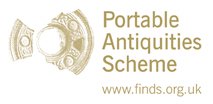Server check!
You are on the training database
Portable Antiquities Annual Report 2018
A copy of the report can be downloaded as a PDF here.
2018 represented another remarkable year for the Portable Antiquities Scheme (PAS), with a further 69,687 archaeological finds being recorded onto its database (www.finds.org.uk), which now totals almost 1.5 million items. These objects greatly vary in their period of manufacture, composition, and state of preservation but collectively they help archaeologists and other researchers better understand Britain's past.
All of the finds this year were discovered by members of the public, mostly through metal-detecting, and all were volunteered to be recorded - with the exception of Treasure finds for which there is a legal obligation to report them. It is this contribution from the public to archaeological knowledge that makes the PAS so unique in British archaeology; the community involvement also explains why the scheme, or similar schemes are being replicated elsewhere in Europe. I must express gratitude to the many finders who have offered items for recording this year and who have helped make this important data set of the past possible.
Central to the Scheme are its 40 Finds Liaison Officers (FLOs) who work with the public to identify and record their discoveries. The Scheme also includes a number of other participants who are key to documenting the finds, including volunteers, paid interns, as well as finders themselves who after expert training record their own discoveries directly onto the PAS database. All of these groups provide vital work to the PAS and I thank them for their dedication.
Our local partnerships, led by the British Museum and Amgueddfa Cymru - National Museums Wales, are crucial to the Scheme's success through their support of the FLOs and other staff, providing them with a base and local management whilst also making considerable financial and in-kind contributions to the Scheme. From a British Museum perspective, these relationships not only enable us to reach out to people across the country but also to share our expertise and support in delivering the PAS and creating an enthusiasm for the past and what we can learn from it.
The British Museum and the PAS collaboration have kindly been supported by The Headley Trust and the National Lottery Heritage Fund's PASt Explorers programme, funding the intern and volunteer programmes respectively. The Scheme also owes a great thanks to Graham and Joanna Barker, who have supported the work of the PAS locally, and Treasure Hunting magazine who have funded the production of this report. Although much of the funding for the PAS is through the UK Government's grant-in-aid to the British Museum, private support of our partners is key to the future success and development of the Scheme. PAS is truly a partnership project and one that is essential to the protection and understanding of Britain's past and its place in the wider world.
Hartwig Fischer


